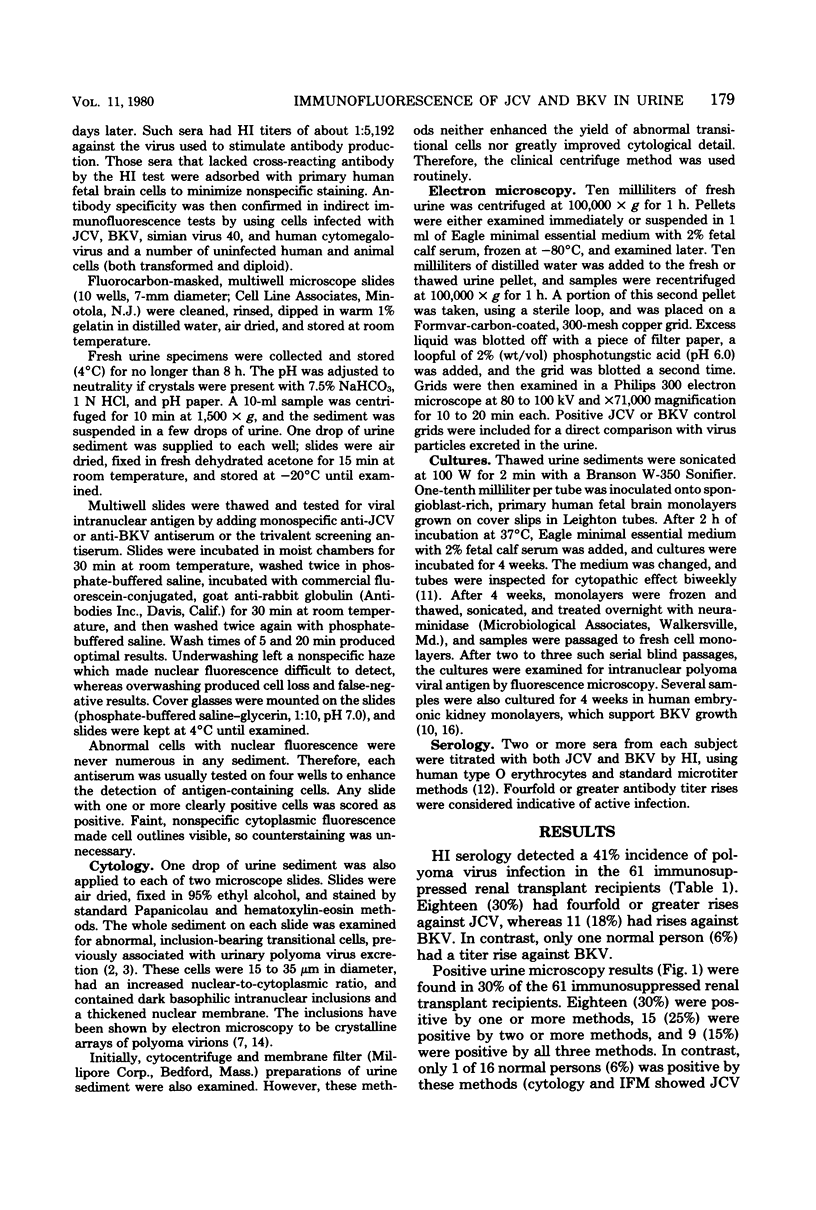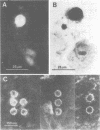Abstract
An indirect immunofluorescence method was developed and used to detect urinary excretion of abnormal transitional cells infected with JC virus (JCV) or BK virus (BKV). This method was compared with urinary cytology, electron microscopy, viral culture, and viral serology in groups of immunosuppressed renal transplant recipients and normal controls. The indirect immunofluorescence method detected and identified JCV excretion in four persons, BKV excretion in one person, and both JCV and BKV excretion in eight others. Viral antigen was identified only in the nuclei of cytologically abnormal cells. Of these 13 persons, 8 also had polyoma virions detected in the urine by electron microscopy. With repeated study of sequential urine samples, 30% of transplant recipients and 6% of normal controls were positive by one or more microscopy methods. Serological results confirmed a high incidence of both JCV and BKV multiplication in the immunosuppressed patients. However, serology did not correlate directly with urinary virological findings. Urinary cytology and the indirect immunofluorescence method were rapid and sensitive methods for detecting and identifying urinary excretion of JCV and BKV.
Full text
PDF





Images in this article
Selected References
These references are in PubMed. This may not be the complete list of references from this article.
- Brown P., Tsai T., Gajdusek D. C. Seroepidemiology of human papovaviruses. Discovery of virgin populations and some unusual patterns of antibody prevalence among remote peoples of the world. Am J Epidemiol. 1975 Oct;102(4):331–340. doi: 10.1093/oxfordjournals.aje.a112169. [DOI] [PubMed] [Google Scholar]
- Coleman D. V., Gardner S. D., Field A. M. Human polyomavirus infection in renal allograft recipients. Br Med J. 1973 Aug 18;3(5876):371–375. doi: 10.1136/bmj.3.5876.371. [DOI] [PMC free article] [PubMed] [Google Scholar]
- Coleman D. V., Mackenzie E. F., Gardner S. D., Poulding J. M., Amer B., Russell W. J. Human polyomavirus (BK) infection and ureteric stenosis in renal allograft recipients. J Clin Pathol. 1978 Apr;31(4):338–347. doi: 10.1136/jcp.31.4.338. [DOI] [PMC free article] [PubMed] [Google Scholar]
- Coleman D. V. The cytodiagnosis of human polyomavirus infection. Acta Cytol. 1975 Mar-Apr;19(2):93–96. [PubMed] [Google Scholar]
- Gardner S. D., Field A. M., Coleman D. V., Hulme B. New human papovavirus (B.K.) isolated from urine after renal transplantation. Lancet. 1971 Jun 19;1(7712):1253–1257. doi: 10.1016/s0140-6736(71)91776-4. [DOI] [PubMed] [Google Scholar]
- Gardner S. D. Prevalence in England of antibody to human polyomavirus (B.k.). Br Med J. 1973 Jan 13;1(5845):77–78. doi: 10.1136/bmj.1.5845.77. [DOI] [PMC free article] [PubMed] [Google Scholar]
- Jung M., Krech U., Price P. C., Pyndiah M. N. Evidence of chronic persistent infections with polyomaviruses (BK type) in renal transplant recipients. Arch Virol. 1975;47(1):39–46. doi: 10.1007/BF01315591. [DOI] [PubMed] [Google Scholar]
- Lecatsas G., Prozesky O. W., van Wyk J., Els H. J. Papova virus in urine after renal transplantation. Nature. 1973 Feb 2;241(5388):343–344. doi: 10.1038/241343a0. [DOI] [PubMed] [Google Scholar]
- Major E. O., Di Mayorca G. Malignant transformation of BHK21 clone 13 cells by BK virus--a human papovavirus. Proc Natl Acad Sci U S A. 1973 Nov;70(11):3210–3212. doi: 10.1073/pnas.70.11.3210. [DOI] [PMC free article] [PubMed] [Google Scholar]
- Padgett B. L., Rogers C. M., Walker D. L. JC virus, a human polyomavirus associated with progressive multifocal leukoencephalopathy: additional biological characteristics and antigenic relationships. Infect Immun. 1977 Feb;15(2):656–662. doi: 10.1128/iai.15.2.656-662.1977. [DOI] [PMC free article] [PubMed] [Google Scholar]
- Padgett B. L., Walker D. L. Prevalence of antibodies in human sera against JC virus, an isolate from a case of progressive multifocal leukoencephalopathy. J Infect Dis. 1973 Apr;127(4):467–470. doi: 10.1093/infdis/127.4.467. [DOI] [PubMed] [Google Scholar]
- Padgett B. L., Walker D. L., ZuRhein G. M., Eckroade R. J., Dessel B. H. Cultivation of papova-like virus from human brain with progressive multifocal leucoencephalopathy. Lancet. 1971 Jun 19;1(7712):1257–1260. doi: 10.1016/s0140-6736(71)91777-6. [DOI] [PubMed] [Google Scholar]
- Rand K. H., Johnson K. P., Rubinstein L. J., Wolinsky J. S., Penney J. B., Walker D. L., Padgett B. L., Merigan T. C. Adenine arabinoside in the treatment of progressive multifocal leukoencephalopathy: use of virus-containing cells in the urine to assess response to therapy. Ann Neurol. 1977 May;1(5):458–462. doi: 10.1002/ana.410010509. [DOI] [PubMed] [Google Scholar]
- Reese J. M., Reissing M., Daniel R. W., Shah K. V. Occurrence of BK virus and BK virus-specific antibodies in the urine of patients receiving chemotherapy for malignancy. Infect Immun. 1975 Jun;11(6):1375–1381. doi: 10.1128/iai.11.6.1375-1381.1975. [DOI] [PMC free article] [PubMed] [Google Scholar]
- Seehafer J., Carpenter P., Downer D. N., Colter J. S. Observations on the growth and plaque assay of BK virus in cultured human and monkey cells. J Gen Virol. 1978 Feb;38(2):383–387. doi: 10.1099/0022-1317-38-2-383. [DOI] [PubMed] [Google Scholar]
- Shah K. V., Daniel R. W., Warszawski R. M. High prevalence of antibodies to BK virus, an SV40-related papovavirus, in residents of Maryland. J Infect Dis. 1973 Dec;128(6):784–787. doi: 10.1093/infdis/128.6.784. [DOI] [PubMed] [Google Scholar]
- Shah K. V., Daniel R. W., Zeigel R. F., Murphy G. P. Search for BK and SV40 virus reactivation in renal transplant recipients. Transplantation. 1974 Jan 1;17(1):131–134. [PubMed] [Google Scholar]



